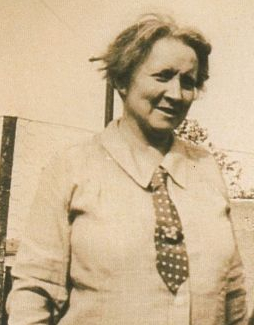Helena Molony facts for kids
Quick facts for kids
Helena Molony
|
|
|---|---|

Molony, circa 1940s
|
|
| Secretary of the Irish Women Workers' Union | |
| In office 1915–1917 |
|
| Preceded by | Delia Larkin |
| Succeeded by | Louie Bennett |
| Personal details | |
| Born | 15 January 1883 8 Coles Lane, Dublin City |
| Died | 29 January 1967 (aged 84) Dublin, Ireland |
| Nationality | Irish |
| Military service | |
| Branch/service | Cumann na mBan |
| Battles/wars | Easter Rising |
Helena Mary Molony (born January 15, 1883 – died January 29, 1967) was an important Irish woman. She was a strong supporter of Irish independence, women's rights, and workers' rights. She bravely fought in the 1916 Easter Rising. Later, she became the second woman to lead the Irish Trades Union Congress.
Contents
Helena Molony: Early Life
Helena Molony was born in Dublin, Ireland, on January 15, 1883. Her father, Michael Molony, was a grocer. Her mother, Catherine McGrath, sadly passed away when Helena was young.
Joining the Fight for Ireland
In 1903, Helena was inspired by a speech from Maud Gonne, a famous Irish nationalist. Helena decided to join a group called Inghinidhe na hÉireann (Daughters of Ireland). This marked the start of her lifelong dedication to Irish independence.
Editing Bean na hÉireann
In 1908, Helena became the editor of the group's newspaper, Bean na hÉireann (Woman of Ireland). This newspaper brought together many important people. It featured articles on fashion, cooking, politics, and poetry. It helped spread nationalist ideas and encouraged Irish culture.
Helping Children in Dublin
Helena Molony also worked hard to help children. With Maud Gonne and others, she helped organize daily school meals. These meals were for children in poor areas of Dublin. She also pushed the Dublin city council to provide healthy meals, like meat and vegetables, to hungry children.
Working for Change and Rights
Helena Molony was also an actress and performed at the Abbey Theatre. However, her main focus was always her political work. She was very good at convincing people to join the independence movement. She even inspired Constance Markievicz and Dr. Kathleen Lynn to get involved.
Supporting Workers' Rights
Helena was a close friend and colleague of James Connolly, a leader in the workers' movement. For a time, she was his secretary. In 1915, Connolly made her the secretary of the Irish Women Workers' Union. This union was formed after a big strike at Jacob's Biscuit Factory in 1911. It was also involved in the Dublin Lock-out of 1913, a major workers' dispute.
Helena managed a shirt factory at Liberty Hall. This factory was created to give jobs to women who had been fired or blacklisted after the strikes. She believed these women were the "real aristocracy" of the country for their bravery.
Spreading the Word
Helena was not afraid to take risks for her beliefs. She once described handing out leaflets on O'Connell Street in Dublin. She and her friends were chased by police but managed to escape. She said they were "young and swift" and outran the police.
Founding Fianna Éireann
Helena's home was a meeting place for many Irish nationalists. In 1909, Constance Markievicz founded Fianna Éireann there. This was a youth organization that trained young people to support the Irish Volunteers. Helena worked closely with Markievicz to build this group.
The 1916 Easter Rising
Helena Molony was a key member of Cumann na mBan. This was a women's group formed in 1914. Its members trained alongside the men of the Irish Volunteers. They were preparing for an armed rebellion against British rule in Ireland.
During the 1916 Easter Rising, Helena was one of the soldiers who attacked Dublin Castle. She was part of the Irish Citizen Army. During the fighting at City Hall, her commanding officer, Sean Connolly, was killed. Helena was captured and held in prison until December 1916.
Life After the Rising
After the Irish Civil War, Helena Molony continued her work for workers' rights. She became the second woman president of the Irish Trades Union Congress. In the 1930s, she remained active in the republican cause. She worked with groups like the Women's Prisoner's Defence League.
Helena retired from public life in 1946. However, she kept working to improve women's labor rights. She passed away in Dublin on January 29, 1967, after a stroke. Helena Molony is buried in the republican plot at Glasnevin Cemetery.
 | Roy Wilkins |
 | John Lewis |
 | Linda Carol Brown |

